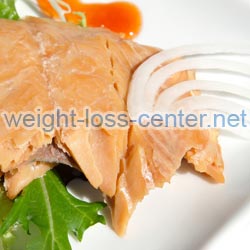Hypothyroidism is a thyroid disorder that lowers the production of the thyroid hormone. The poor supply of this hormone in the body disrupts the body’s metabolism and normally causes physical and mental adverse conditions. Symptoms of hypothyroidism observed in adults include fatigue, cold sensitivity, depression, constipation, goiter, headaches, low appetite and weight gain among others. When hypothyroidism is suspected, doctors test for it by checking the levels of thyroid-stimulating hormones in the blood. Although not all causes of hypothyroidism are understood, the majority of cases is attributed to a deficiency in iodine, childbirth or genetics.

Weight gain caused by an under-active thyroid can often be successfully treated by following a hypothyroidism diet that is high in protein-rich foods, such as fish.
The greatest concern for most people with hypothyroidism is weight gain that arises when the food energy they consume is not metabolized efficiently and thus accumulates as body fat. Some of the recommended solutions for hypothyroid weight gain include drug therapy, physical exercise and a healthy diet. Some of the thyroid hormone replacement drugs used to treat hypothyroidism include Thyroid and Synthroid. However, hypothyroid medications can cause serious health side-effects and should be taken only under the direct supervision of a doctor.
In many cases, hypothyroidism weight gain can be managed with a healthy diet. Individuals with hypothyroidism who want to manage their weight through diet should avoid foods that contain a lot of salt, iron, calcium, soy and drugs for acidity or ulcers. This is because products with soy, antacids and vitamins hinder the absorption of the thyroid hormone. However, if you have a pre-existing condition, such as Gastroesophageal Reflux Disease (GERD), that is treated with antacids seek medical advice about the best dietary options for you. Besides this, people with hypothyroidism are encouraged to eat foods that contain fiber, zinc, copper and iodine. Also, protein-rich foods that contain the amino acid tyrosine like chicken, turkey, fish, avocado, bananas, milk, cheese, yogurt, cottage cheese, lima beans, pumpkin seeds, and sesame seeds, are particularly good to add to a hypothyroidism diet because tyrosine increases the production of thyroid hormone. Hypothyroidism diet plans also suggest that you limit carbohydrate intake, thus a diet high in protein and fiber and low in carbohydrates, such as Eco-Atkins, may be suitable as a hypothyroid diet.
Physical exercise is also greatly encouraged for people with hypothyroidism as it helps the body jump start the metabolism system that burns off excess weight. Moreover, getting enough rest and adequate sleep also significantly helps the body’s metabolism function better. It is also good for people with hypothyroidism to know how to calm their bodies by selecting the most effective technique that works for them. For instance, if using aerobics does not work to relive stress they can choose other methods like tai chi or yoga.
Individuals with weight gain problems caused by hypothyroidism need to be aware that their unbalanced body chemistry makes it harder for them to lose weight as fast as they would like to. People with underactive thyroid need to make lifestyle changes, such as eating a healthy diet and regular exercise, that will not only help them to lose excess weight, but will help them to maintain a healthy body weight over the long term. In addition, avoiding stimulants, drinking plenty of water, reducing stress, staying motivated to lose weight and doing daily relaxation techniques can go a long way towards helping hypothyroidism individuals get control over their body weight.





High protein, low carbs, good iodine sources, a diet for hypothyroidism is good for everybody ! Anybody who is struggling to lose weight should read on it.